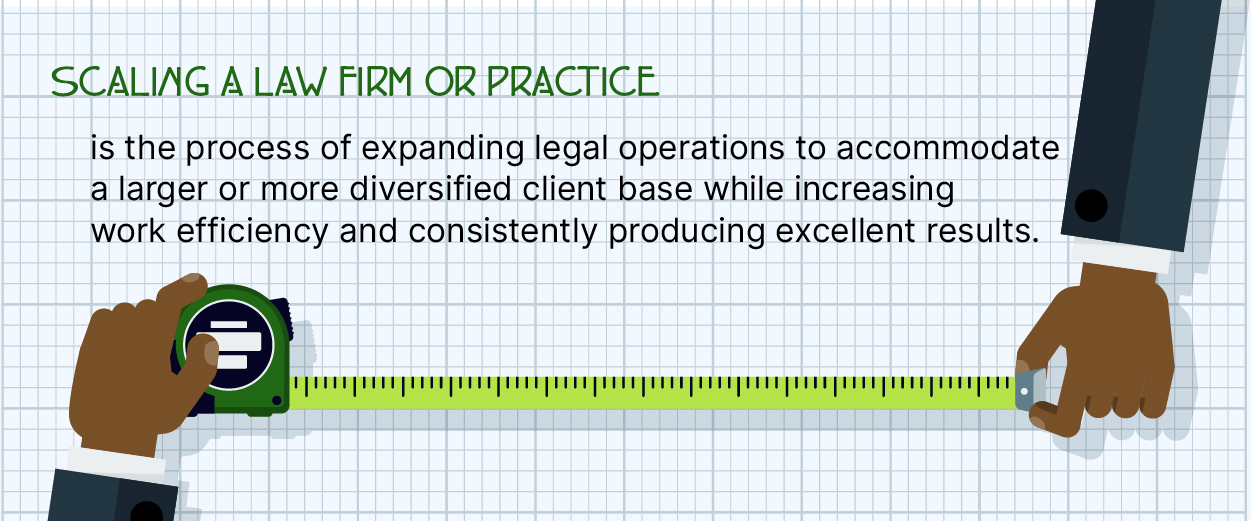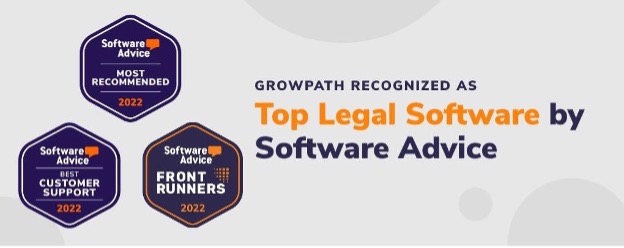From a Drop to a Deluge: Scaling a Law Firm or Practice to Fit Your Vision of Success
Whether you’re a partner at a big firm or the owner of a small one, scaling your firm or your practice could be a way to increase revenues while saving time, energy, and effort in the long run.
As a result, you’ll be able to attract a few more clients (or a lot), take on bigger cases, or develop new practices with robust operations and a specialized team to give every client a positive experience. This can be true whether you oversee a high-stakes litigation practice or own a small family law firm.

What it Means to Scale Your Law Firm
Scaling a law firm or practice is the process of expanding legal operations to accommodate a larger or more diversified client base while increasing work efficiency and consistently producing excellent results.

The legal industry is a business, after all, and so scaling a firm is often a business endeavor. It can encompass hiring more lawyers and staff, utilizing systems and processes to streamline tasks, and implementing technology to analyze operations and increase efficiency on an ongoing basis.
Ideally, your firm would have people, processes, technology, and perhaps office space in place so that your practice grows and runs in an effective, yet cost-efficient manner, letting you make high-level, strategic decisions at key moments while your team manages day-to-day firm functions.
The problem is that most lawyers, even the best ones, mostly think like… well… lawyers, not business owners. But if you want to scale a firm, you will need to think more like a CEO and less like an attorney. This entails working on your firm or practice like an entrepreneur to make it grow according to your vision.
Sign up for a free demo to see how GrowPath Legal Case Management Software can help you scale your firm or practice.
5 Simple Steps to Start Scaling Your Practice
Scaling is a process that requires significant forethought as well as ongoing oversight and management. This may make it seem like scaling your practice is a job in and of itself.
However, with skillful management, you’ll soon discover that you’re able to generate more revenues without a significantly larger expenditure of time, effort, or energy on your part, which is the whole idea, isn’t it?
Here are 5 steps to help you start scaling your practice: ![]()
Step 1: Planning – Set your business goals for scaling your practice and how you’ll measure progress objectively. These could include increased revenues, entering new practice areas, or deepening service capability in existing ones. This should include an analysis of your firm’s current operations to identify opportunities to increase efficiencies.
One guideline you can use is the 80-20 Rule, also known as the Pareto Principle: that 20 percent of effort drives 80 percent of value in business. Note that this is more of a heuristic rule-of-thumb and not a hard-and-fast mathematical formula.
Your goal as CEO of your firm or practice is to scale by identifying and focusing on the top 20 percent most valuable activities you engage in, then finding ways to spend more time on those activities.
This also means identifying the 80 percent of tasks that are less valuable and then finding ways to lower their priority level, delegate them, or eliminate them completely. ![]()
Step 2: Researching – Once you have your goals in mind, research the tools, technologies, processes, and systems available that you can use to help scale your firm or practice. This could include putting together a committee or taking on the responsibility to explore the possibilities yourself.
![]() Step 3: Strategizing – With your goals in mind, you can apply what you learned in your research to organize a series of tactics to help you achieve them. This could include implementing innovative technologies (such as legal case management software), forming new partnerships, hiring new staff, achieving new qualifications, or launching innovative marketing initiatives.
Step 3: Strategizing – With your goals in mind, you can apply what you learned in your research to organize a series of tactics to help you achieve them. This could include implementing innovative technologies (such as legal case management software), forming new partnerships, hiring new staff, achieving new qualifications, or launching innovative marketing initiatives.
Step 4: Implementation – When the time is right, put your plan into action and begin making the necessary adjustments to start scaling successfully. There could be some heartburn in the face of change, but it will all be worth it when you start making more money and helping more people for far less effort and energy. ![]()
Step 5: Measuring, Analyzing, and Adjusting – As you implement your plan, you’ll have the opportunity to analyze its effectiveness based on the results you achieve. Legal case management software such as GrowPath includes analytical tools and dashboards for the exact purpose. The 80-20 Rule comes into play here too, as you can devote more resources to what’s working and less to what’s not. ![]()
Some things to consider as you plan for scaling your firm include:
Hiring and assigning roles strategically – Hiring more lawyers and staff for your existing practices, or expanding into new practices, will involve finding the right people for the right role. It’s crucial to take the time to find the best fit for each position, rather than rolling the dice on anyone who seems qualified on paper.
Legal case management – The processes and technology you use to manage a case from inception to completion. This can include administrative tasks such as intake and marketing, case assignment and supervision, and your firm’s day-to-day operations.
Networking and referrals – Building a network of referral partners with other lawyers and professional services providers (such as CPAs, financial advisors, and business consultants) can provide you with an ongoing case, client, and revenue stream that you can use to scale your firm.
According to Above the Law, referrals are still the top source of business for attorneys.

Practice diversification or specialization – Entering new markets by expanding your practice offerings beyond your core practice, or going deeper and specializing in a particular practice to differentiate from your competitors – both of which can increase your market share and drive increased revenues.
Don’t forget your personal goals
In addition to your business goals for scaling, don’t lose sight of your personal goals for doing so, as well. This will keep you motivated to help you persist through any speedbumps you encounter.
Keep in mind the personal reasons you might have for wanting to scale your firm or practice, and what it would mean for you:
Would it mean more money, more (or any) free time, less stress, or more opportunity to help those in need of your services? What would those things mean to you, personally?
Remember: “Persistence” is the watchword of entrepreneurship. Even if you struggle with scaling your firm in the short term, keep at it! True grit is one of the qualities most closely associated with success, according to University of Pennsylvania researcher and Ted Talk presenter, Dr. Angela Duckworth.
Scaling Your Law Firm with Artificial Intelligence (AI)
AI for legal services is still in its nascent stages, but it’s becoming increasingly ubiquitous as firms find ways to use artificial intelligence to serve more clients and increase revenues. Here’s a story illustrating some of the ways a lawyer could use AI to scale their practice:
Personal Injury AI App Synergistic Use Case
“Jessica” is an experienced PI attorney who is renowned for her legal knowledge and skill. But what makes her unique among her peers is the sophisticated AI-driven case management system she uses for managing her car accident practice.
One day, a man named John is driving his car when he’s suddenly struck from behind at a red light, causing him severe injuries. As he searches online for car accident-related information, Jessica’s AI detects his search pattern and serves him with an ad before he reaches out to any of her competitors.
He clicks on the ad, and it takes him to an AI intake chatbot that asks him questions about his case. As he responds, it feeds his answers into a lead scoring system to determine how good of a fit his case is for Jessica’s practice. Jessica receives an alert on her phone that John’s case is a near-perfect fit, and she follows up by sending him an AI-generated engagement letter with a click-to-sign agreement that he accepts. His case file opens automatically, populated with the information he provides during intake.
Meanwhile, the chatbot detects keywords that suggest John might have another case in addition to his car accident claim. Jessica follows up and discovers that his car has defective parts for which there’s a mass tort he can also join.
Saving the newfound case for later, she inputs all the car accident details into her AI system including traffic camera footage, police reports, medical records, and witness statements. The AI detects inconsistencies in the other driver’s statements she’d originally missed that suggest he was 100% at-fault.
Jessica’s AI system analyzes data from similar cases including court records as well as information about judges’ behavior and insurance company strategies. The AI then factors this information into a draft demand letter which Jessica reviews before sending to the insurance company. The AI also provides her with a trial strategy including potential deposition questions in case the claim goes to trial.
The insurance company responds with a series of arguments, but with the help of her AI, Jessica counters them with irrefutable evidence. The insurance company finally offers John a substantial settlement, for which he’s grateful.
 Law Firm Scaling Pitfalls and How to Avoid Them
Law Firm Scaling Pitfalls and How to Avoid Them
Risk is an inherent part of scaling your law firm as it is an inherent part of all business endeavors. To help you reduce risk and increase the chances of scaling successfully, avoid these potential pitfalls:
Knowledge deficit
Not having the crucial info you need to scale your business effectively will increase the likelihood that your efforts will end in failure. Educate yourself about scaling law firms in a general sense, and then ask yourself how you can apply those principles to your firm’s unique circumstances.
If the information is available, you should also review any data or analytics you have about your firm’s operations, looking for opportunities to increase efficiency.
Scaling at the wrong time
Scaling too soon or too late can lead to mismanagement of the process. This is why it’s crucial to have a scaling plan that includes a timeline showing key milestones along the way.
Not marketing
A major aspect of scaling your firm or practice could be based on increasing your capacity to provide legal services. While it’s true that word-of-mouth is huge for legal marketing, it’s not the only way to drive increased business development and reach more potential clients as you scale your firm.
Focus on marketing that supports your scaling goals and drives increased intakes.
Some scalable tactics to market your law firm online include:
- Search Engine Optimization (SEO)
- Blogging
- Social media
That being said, don’t forget that the best way to get more clients is to take excellent care of the ones you already have. According to Nielsen, 92% of people trust recommendations from friends and family more than any other source of information.

Hiring for the moment and not the future
Having attorneys and staff available is crucial to your firm’s ability to handle larger case volumes or more diverse cases. But, as the old saying goes, “Good help is hard to find.” Take the time to hire the right person for the job, rather than whoever seems most qualified on paper. This will make a hugely positive difference to how well your firm develops and scales overall.
Forgetting about culture
What often happens among firms that scale is that they forget their culture – the shared beliefs, values, and missions.
These abstract concepts can get lost or forgotten as your firm grows, so be sure to remember what your firm stands for and reinforce those values regularly as more attorneys and staff join on.
How Legal Case Management Software Can Help Your Law Practice Scale
Legal case management software, like GrowPath, can aid in your efforts to scale your firm or practice with the following features:
Lead scoring – As you know, some cases are a better fit for your firm or practice than others. Lead scoring allows you to indicate what type of cases you want, and then evaluate intakes as they come in based on those criteria. You can then use the score as a basis to decide which cases to accept and which ones to refer out for fees.
Matter trackers – Staying up on the ongoing developments in all your cases can take a lot of time, and there’s always the possibility of something important, like a filing deadline, falling through the cracks. Matter trackers keep you up to date with customized alerts and automated communications whenever it’s time to move a case forward.
Employee productivity tools – Monitor the performance of your new and existing hires as you scale. This will allow you to discern the high performers from those who need more coaching or training as you scale.
Why Choose GrowPath Legal Case Management Software
GrowPath was recognized as a Top Legal Software “Frontrunner” by Software Advice, a publication that reports on top software in different product categories.
We earned this accolade after becoming one of its most recommended legal software programs for 2022, and for our emphasis on excellent customer support.

“GrowPath is the most innovative and advanced case management software I’ve seen.” – Ken Hardison, president of the Personal Injury Lawyers Marketing and Management Association (PILMMA)
Curious to see how GrowPath can help you scale your law firm or practice? Schedule a free demo with us today and we’ll show you!
FAQs
How to build a law practice?
If you wish to build a successful law practice, you can start by developing knowledge, skills, and experience in practice areas that fit your interests. Then, you can implement a marketing plan to drive business through traditional and integrated legal marketing strategies. Finally, by serving your clients well, you’ll earn referrals and repeat business, which will help you build your practice as you continue marketing.
How do I run a successful law practice?
The most important thing you can do to run a successful law practice is to make your clients’ happiness and success your highest priority. Not only will this make your law practice more likely to succeed, but it will also help you build a positive reputation in the communities you serve, which will ensure ongoing growth and success in the future, as well.
What Steps Should You Take for Growing Your Law Practice?
There are three main steps to growing your law practice: 1 – Set your goals based on measurable objectives, such as increasing firm revenues or attracting more clients. 2 – Plan a strategy with tactics that help achieve your objectives, such as hiring new attorneys or using modern technology. 3 – Measure and analyze the results of your plan, adjusting based on what’s working to grow your practice and what isn’t.
How do you scale a legal department?
Scaling a legal department requires identifying opportunities for increased efficiencies and growth, then planning and implementing a strategy to capitalize upon them. This can include hiring new attorneys and staff, implementing new processes and technology, or engaging in innovative marketing strategies to increase efficiency and legal market share at the same time.